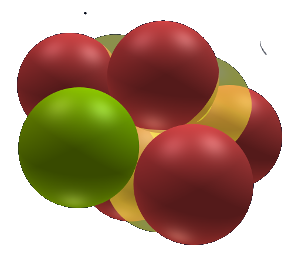LI-CA unknown metal element
This configuration would be the expected configuration for the element after Oxygen if the third D nuclet would form a Li nuclet on one side of Carbon.
It seems that before a full new nuclet can be formed on either one of the two growing spots, the other side must be complete as well in the sense that first one side must be a neutral 5-ending before the other side can be occupied.
See Na where the first Li nuclet is attached to the initial Carbon nuclet.
Update:
The nucleon that is added after O16 (carbon nuclet and two Deuteron nuclets) will take place where it is most connected to the original shape. That is the 5-ending position.
Adding another one will go to the next place of strongest binding energy (which is NOT the position to create the Li nuclet as is shown here)!!
This is not the place because the Li nuclet is an opened up state, or a morphed geometric grouping that has a "hole" in the center, meaning the tetrahedrons are distorted and carry a little bit of energy diminishing the binding energy for that place. That results in the 17 th nucleon taking place on the opposing side of the C nuclet as is shown in the O17 atom.
| Element | |
| Stability |
|
| Isotope | |
| Abundance | |
| Half Life | |
| Decay | |
| Protons |
18
|
| Inner Electrons |
9
|
| Outer Electrons |
9
|
| Nuclear Spin | |
| Mass Actual | |
| Mass H Norm |
0.0000 AMU
|
| Mass Calc |
18.1409 AMU
|
| BE Nucleon | |
| BE Actual |
0.00 MeV
|
| SAM Lines | |
| BE SAM Lines | |
| BE Difference | |
| AN-ISOTOPE | |
| Nid | 645 |
state: final
protons:
P0:
P1:
P2:
P3:
P4:
P5:
P6:
P7:
P8:
P9:
P10:
P11:
nuclets:
N00:
state: lithium
attachAngle: 3
protons:
P1:
P3:
P4:
P5:
P9:
P11:
